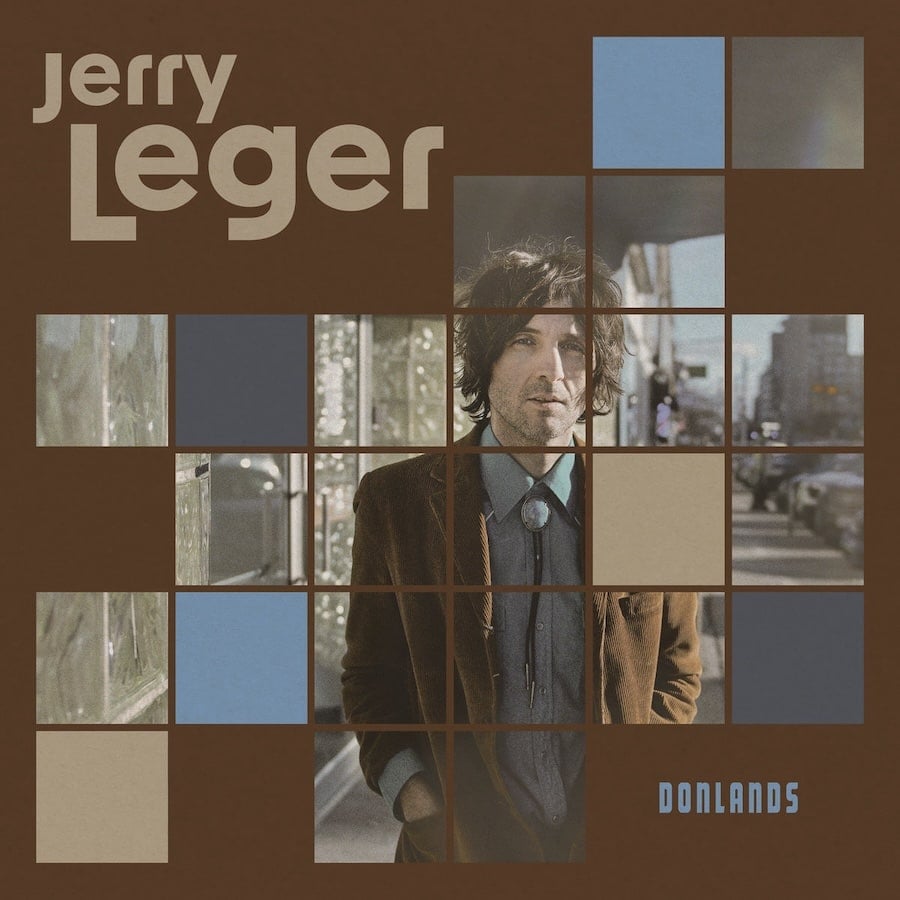
Since making his debut in 2005, the Vancouver-based singer-songwriter Jerry Leger has released a further 14 albums, variously solo or as side projects. For his latest, Donlands, he’s teamed with legendary Canadian producer Mark Howard, whose trademark atmospheric sound has brought an entirely new dimension to this album named after the street in Toronto’s east end where it was recorded, in what once was the Donlands Theatre. This new incarnation of his sound is first heard in the opening Sort Me Out, which, sharing a shuffling weary musical mood with 500 Miles, has him evoking an echoey falsetto as he sings about seeking to recapture love and faith (“I gave it all away/Then I wanted it back”) when you’re lost (“You can’t win/When you don’t know/What you’re fighting for/Journey of a bullet/Reason for a scar/And the way we are portrayed/What’s real, who’s to say”) in a supportive relationship (“here you are right on cue/To sort me out”).
A somewhat less positive relationship (“When her alarm went off this morning/She had already split/And I thought things were going/Much better than they were”) fuels the staccato waltzing I Was Right To Doubt Her with its organ and percussion creating a border country desert ambience where life in a dead end town (“a sleepy kind of city/And a stubborn set of rules/The local closes at eleven”) sees the narrator’s lover being drawn back to earlier arms (“I was not her first man/And I would not be her last/I was caught up in what I wanted/And what she wanted was in the past”).
Brushed drums, twanged guitar, organ-backed slow waltztime sway also underpins the loss that informs I’ll Stay (“It’s lonely on the bottom/And death at the top/They’ll be singing your praises/When the story is hot/And I’ll be here missing/Those good days we knew”), except this time he’s the one with leaving in mind and finding reasons not to (“This time next Friday/I’ll be dancing up a storm/To a band I’ve admired/Ever since I was young/The singer was shaky/And the band dodgy too/But they still swing for the fences/With nothing to lose/Tell me/You want it this way/Give me one reason and I’ll stay”).
Piano and organ sustain the mood on the mid-tempo country soul Three Hours Ahead Of Midnight, again about looking to cling on and pull through (“Take my hand and we’ll see this through/Just like paper in the wind/Pushed into what we could do/But now we’re resisting… Don’t you break down on me/While we have some joy left/Before they take me from your reach/And you won’t know where I went”).
Introducing pedal steel into the mix, the slow walking The Flower And The Dirt is a terrific ballad of aching loss and regret for another doomed (“My bad habits returned/So you too gave them a go/But they didn’t fit you right/Just made you feel worse”) relationship (“When we decide that it’s over/And the red curtain drops/The spotlight starts fading/And the people file out/You can have the glory/And I’ll take the hurt/You were always the flower/And I was always the dirt”).
Sharing a similar scenario (“In the worst of years/Said it was best to leave me be/Where she had to go/I couldn’t be following/So, goodbye to what we knew”), there’s more heart-wrenching on the piano ballad Wounded Wing which plays its story in a sepia cinematic narrative (“The whistle blows/But the work ain’t done/Looking down to see/Another town crumbling…She waits for the siren/That waits for the door/In walks the killer/And in comes the hound/One waits for the hammer/And waits for the ground”).
There’s a jarring musical shift with You Carry Me as fuzz bass gives a choppy funky psychedelic pop groove, though lyrically it remains in familiar established territory (“I don’t want you to wait for me/But I don’t want you to go”), before calming down for the dreamy early hours feel of the piano, upright bass and pedal steel shaded mental and emotional exhaustion of I Need Love (“I’m lonely and scared/I’m not equipped as I thought I was/To let my body stand bare/And survive every shot…I need love/To brace me up/Strength from the heavens/Just won’t be good enough”).
Moog synth bubbles like a mud pool throughout the pedal steel keening slow march Out There Like The Rain with its gospel undercurrents and lyrics that address addiction (“She was out there like the rain/But didn’t tell a soul/Using anything to ease the pain”) and economic inequality (“somewhere there’s a crack in the wealth/And the poor just keep on losing”), with the rain a blessed relief from the heat as the song turns into a metaphor of faith in “Seeing what/Was at the beginning/Before the rain”.
It ends, with the entire band adding vocals, steel and a wearied pace with more cinematic imagery in a Slow Night In Nowhere Town (“Stabbing cigarettes in a metal ashtray/Picking fights and standing your ground/But the only thing there is the mirror and you”) with themes of creative impasse (“Another coffee on a breathtaking day/But have nothing to talk about/Things drying up in my writing pen”), decline (“Main drag was once a parade/Now it always looks closed down”) and stasis (“Gloves worn through the fingers and palms/Me and Bert stuck on Thirteen Down/I’ve seen this movie a thousand times”), but still with a faint ray of light (“Snake bit/But I ain’t dead…One lone dancer and a mirror ball/She’s the only soul around I’ve found/Pours me another when the song is done”) as it fades away on the repeated title refrain.
An introspective journey through anxieties, fears, loss, need, loneliness and love; while Donaland’s is not always the most uplifting of listens, it’s assuredly one of Jerry Leger’s finest works.
Bandcamp: https://jerryleger.bandcamp.com/album/donlands
